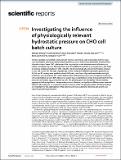Investigating the influence of physiologically relevant hydrostatic pressure on CHO cell batch culture
Author(s)
Shang, Menglin; Kwon, Taehong; Hamel, Jean-Francois P; Lim, Chwee Teck; Khoo, Bee Luan; Han, Jongyoon; ... Show more Show less
DownloadPublished version (2.907Mb)
Publisher with Creative Commons License
Publisher with Creative Commons License
Creative Commons Attribution
Terms of use
Metadata
Show full item recordAbstract
© 2021, The Author(s). Chinese hamster ovary (CHO) cells have been the most commonly used mammalian host for large-scale commercial production of therapeutic proteins, such as monoclonal antibodies. Enhancement of productivity of these CHO cells is one of the top priorities in the biopharmaceutical industry to reduce manufacturing cost. Although there are many different methods (e.g. temperature, pH, feed) to improve protein production in CHO cells, the role of physiologically relevant hydrostatic pressure in CHO cell culture has not been reported yet. In this study, four different hydrostatic pressures (0, 30, 60, and 90 mmHg) were applied to batch CHO cells, and their cell growth/metabolism and IgG1 production were examined. Our results indicate that hydrostatic pressure can increase the maximum cell concentration by up to 50%. Moreover, overall IgG1 concentration on Day 5 showed that 30 mmHg pressure can increase IgG1 production by 26%. The percentage of non-disulphide-linked antibody aggregates had no significant change under pressure. Besides, no significant difference was observed between 30 mmHg and no pressure conditions in terms of cell clumping formation. All these findings are important for the optimization of fed-batch or perfusion culture for directing cell growth and improving antibody production.
Date issued
2021Department
Singapore-MIT Alliance in Research and Technology (SMART); Massachusetts Institute of Technology. Department of Electrical Engineering and Computer Science; Massachusetts Institute of Technology. Department of Biological Engineering; Massachusetts Institute of Technology. Department of Chemical Engineering; Massachusetts Institute of Technology. Research Laboratory of ElectronicsJournal
Scientific Reports
Publisher
Springer Science and Business Media LLC
Citation
Shang, Menglin, Kwon, Taehong, Hamel, Jean-Francois P, Lim, Chwee Teck, Khoo, Bee Luan et al. 2021. "Investigating the influence of physiologically relevant hydrostatic pressure on CHO cell batch culture." Scientific Reports, 11 (1).
Version: Final published version